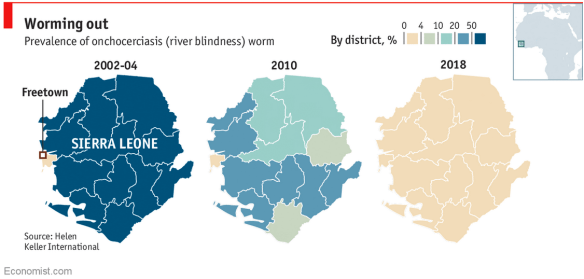Did IMF policies lead to the inability of the health systems in Liberia, Guinea, and Sierra Leone to contain the ongoing Ebola outbreak?
There has been a lot of back and forth on this question in the blogosphere, the most prominent being posts over at the Monkey Cage Blog by Benton and Dionne on the one hand, and Blattman on the other.
It’s really hard to pin the total collapse of the health sectors in the Mano River Region on specific IMF policies. We don’t have counterfactual Mano River Regions that: (a) did not experience civil wars in the early 1990s, (b) did not have to implement structural adjustment policies (because of severe self-inflicted fiscal distress), and/or (c) reformed their institutions and systems of government to make them more responsive and efficient in providing social services before the outbreak in late 2013.
So the best we can do, really, is to speculate (see this informative post by Morten Jerven).
As Blattman argues, countries that required IMF help from the late 1980s did so because their central banks and treasuries had failed at managing their fiscal and monetary policies (the IMF was essentially a central bank of last resort). Which raises the possibility that perhaps we should blame these countries’ troubles on the Latin American countries that made everyone realize that the developing world’s debt in the early 1980s was unsustainable; or the world commodity crises of the 1970s.
In light of the events of the early 1980s, a plausible simple defense of the IMF is that things could have been much worse (total financial collapse) if it had not intervened. In other words, that it is not clear whether, left to their own devices, highly indebted developing countries would have had an autonomous recovery in a manner that would have laid the foundation for their healthcare systems to be strong enough to identify and contain an Ebola outbreak in their respective remote rural regions in late 2013.
That said, IMF interventions – whatever the justifications – had consequences. The discussion in the blogosphere so far has almost exclusively focused on the fiscal effects of IMF policies (specifically with regard to social spending). But as Herbst has argued in “The Structural Adjustment of Politics in Africa,” there were political consequences as well:
……… there has been almost no attention devoted to what structural adjustment, if implemented, means for the way that politics is actually carried out in African nations. The failure to examine the long-term consequences of economic reform for politics is particularly surprising given that the major instruments of structural adjustment — public sector reform, devaluation, elimination of marketing boards—threaten to change not only the constituencies that African leaders look to for support but the way in which leaders relate to their supporters in the countries south of the Sahara.
……… The paper finds that structural adjustment makes the political climate much riskier for leaders while weakening the central apparatus of the state on which rulers have long relied to stay in power.
Time horizon concerns have significant effects on whether politicians choose to invest in public goods. The obvious question then is: Without top-down procrustean IMF intervention back then, would highly indebted governments have avoided total economic meltdown via policies that were (relatively more) incentive compatible with their unique political economies? The studies highlighted by Dionne and Benton delve into some of the political economy consequences of SAPs, and the specific ways in which they impacted social service provision.
So going back to the question of whether the IMF reduced the Mano River Region’s capacity to handle Ebola, the simple answer is that we can’t tell for sure. The case for a direct causal relationship is weak at best. But there are also lots of possible causal mechanisms that indirectly implicate the IMF. There is a reason why so many smart academics criticized the implementation of SAPs.
The lesson here is twofold:
(i) Neither the Bank nor the IMF are omnipotent puppet masters able to direct public policy in developing countries. But the same developing countries also lack the ability to perfectly sidestep the policy prescriptions from the IFIs. They have agency, but in very tight corners.
and (ii) International intervention should always, to the extent that is reasonably possible, be embedded in domestic political economies. We (the royal we in development research & practice) like talking about self-enforcing this and that, but then prefer to play “neutral” and “apolitical” interveners all the time. Because we do not live in a world of benevolent social planners, there is seldom anything like a disinterested, value-neutral, and victimless intervention.






